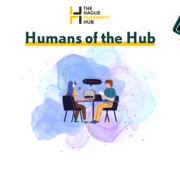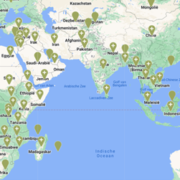COP27 – from climate anxiety to calls for action: reactions from The Hague Humanity Hub Community
By Sarah Bumberger
A compensation fund for climate damage, financial aid for poorer countries, the 1.5-degree target – the UN Framework Convention on Climate Change (COP27) passed resolutions on many topics. But in many areas the results remain unspecific.
We asked members of The Hague Humanity Hub who specifically work on climate justice and action for their reactions to the conference and the agreements reached. James White (DecisionHall/Climate Action Center), Paulien Boone (KlimaatPositief), Piotr Drozd (Leaders for Climate Action/Scaling for Impact), and Serge Santoo (Polycentric) all contibuted.
What is your reaction to the establishment of a loss & damages fund?
“Overall, my main take away is that we see failing leadership, quarrelling about major or minor – financially/economically driven – details. And in all honesty, COP doesn’t really bring about the change needed or actually speed up the process. I do see an increasingly large stake for local communities to take action”, says Serge, adding that “this is something that should have been taken care sooner”.
Piotr says: “While the establishment of a loss and damage fund is a historic win for climate justice and frontline communities, it should not deflect attention from the fact that our ‘carbon bathtub’ is very close to overflowing. The only way to stop the flow is to collectively commit to phasing out all fossil fuels and regularly raise ambition levels, which is where COP27 fell short.”
Paulien agrees, and puts it like this: “The decision to establish a loss and damage fund is historic and must be followed up by designing a properly funded mechanism that reaches the most vulnerable communities. It’s also the biggest success of COP27: This climate change conference reaffirms that decisive climate action cannot depend on intergovernmental processes alone”.
How do you think decisions taken at COP27 (and CMA4/CMP17) will positively/negatively the target limiting global temperature rises 1.5 degrees?
“I don’t think decisions are the issue here, it’s acting in good faith on the decisions we’ve already made that’s the issue. We need more real action, and we need to share the knowledge of successful projects when they happen so they can be replicated elsewhere”, argues James.
Paulien rounds up with highlighting: “Climate leadership is not measured in speeches by heads of government. Rich countries, including The Netherlands, are not delivering on reducing emissions or even providing new and additional climate finance for vulnerable communities. What we need is true leadership that translates into reduced emissions for a liveable planet and adaptation to the impact of the climate crisis. That includes cutting fossil fuels and ensuring a just transition; we can all play our part in achieving this and holding our governments accountable. Every fraction of a degree matters.”
“Every fraction of a degree matters” – Meaning, we need to set the course now to keep the 1.5-degree target within reach, mitigate the dramatic impacts of climate change and adapt to make substantial progress on climate finance needed to significantly accelerate climate action.









